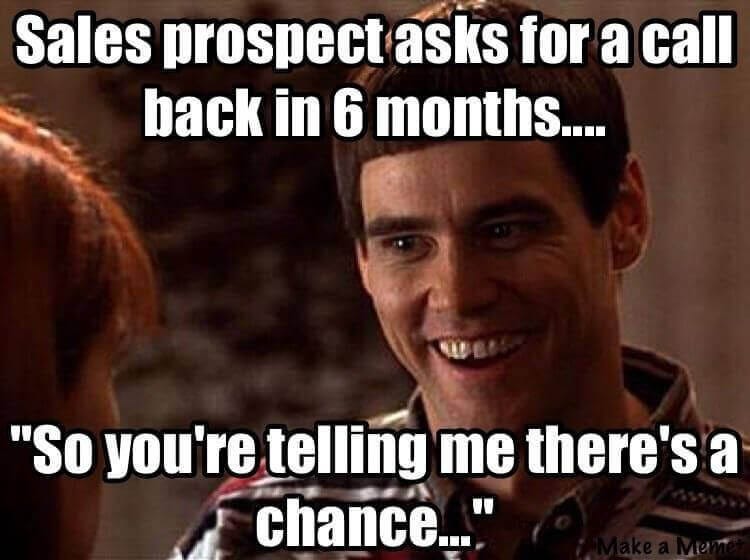Tuesday Tuneup- #19
Top 10 Things You Should Never Say in Sales
Happy Tuesday everyone!
Getting off track in sales is a relatively easy thing to do. As sales pros we are constantly trying to adapt to our communication styles to match our customers and in doing so, can fall into some bad habits. Thus why the “Tuesday Tuneup” was started…. to provide a constant “Tune-up” and help get us all back to center.
Today’s edition is all about language that I find frequently works its way into our talk tracks and subconsciously sends the wrong messages to our buyers. That’s to say that the way your customer “PERCEIVES” your message is the message that they ultimately hear. It doesn’t matter how you think you sound, what matters is your customers perception of what it is that you are saying.
Rather than looking at this list as my attempt to turn you all into a bunch of brainless sales robots…. I instead, ask that you think of the list like this
“When I say these things, my customer stops thinking about the words I’m saying and instead, starts to think negatively about me”
1. "Trust me."
While it might seem like a way to reassure a potential customer, saying "trust me" can often have the opposite effect. Trust should be built through your actions and the information you provide, not through a direct request.
Example to Avoid: "Trust me, this is the best option for you."
Better Approach: "Here’s why this option might be the best fit for your needs: [provide data, testimonials, or case studies]."
2. "This is the best product on the market."
Absolute statements can come across as arrogant and may prompt the customer to challenge your claim. Instead, focus on the unique strengths and benefits of your product.
Example to Avoid: "This is the best product on the market, hands down."
Better Approach: "Our product offers unique features such as [specific features], which provide benefits like [specific benefits]."
3. "I don’t know."
While honesty is important, admitting you don’t know something without following up can damage your credibility. Always offer to find the information and get back to the customer.
Example to Avoid: "I don’t know the answer to that."
Better Approach: "That’s a great question. Let me find out for you and get back to you with the information."
4. "Our competitors are terrible."
A pet peeve of mine….Negative comments about competitors can come off as unprofessional and might make the customer uncomfortable. After all, they might have liked one of your competitors and you just told them they almost made a stupid decision. It can also put you in legal trouble. Focus on what you can offer rather than disparaging others.
Example to Avoid: "Our competitors’ products are terrible compared to ours."
Better Approach: "Here’s how our product stands out: [highlight unique features or advantages]."
5. "What’s your budget?"
Asking about budget too early in the conversation can feel intrusive and may put the customer on the defensive. Instead, discuss their needs and tailor your offering based on that information.
Example to Avoid: "So, what’s your budget for this project?"
Better Approach: "Tell me more about what you’re looking to achieve with this project, and we can explore the best options within your range."
6. "Let me be honest with you."
Phrases like this imply that you might not have been honest previously, which can undermine trust. Aim to be consistently transparent without needing to announce it.
Example to Avoid: "Let me be honest with you, this is the best deal you’ll find."
Better Approach: "Based on what I know, this deal offers significant value for [specific reasons]."
7. "You should..."
Direct commands can feel too forceful and may put customers off. Instead, offer suggestions or recommendations that guide the customer without pressuring them.
Example to Avoid: "You should choose this package; it’s the best."
Better Approach: "I recommend considering this package because it includes [specific benefits]."
8. "This might not be for you."
My first boss loved a good take away. It always felt disingenuous and gimmicky. Besides, the best customers already knew they qualified and saw right through it. Instead, focus on finding the best fit.
Example to Avoid: "This might not be for you, but let’s look at it anyway."
Better Approach: "Let’s explore how this option could meet your needs, and if it’s not a fit, we’ll find something that is."
9. "I’m just following up."
This phrase can make your follow-up seem unimportant or routine (As in, your time doesn’t matter and you are begging them to work with you). Always add value in your follow-ups by providing new information or addressing a specific need.
Example to Avoid: "I’m just following up on our last conversation."
Better Approach: "I wanted to follow up with you and share some new insights that might be helpful based on our last discussion."
10. "Sorry for bothering you."
Apologizing for reaching out can make you appear less confident and suggest that your time and offer are not valuable. Instead, be assertive and respectful.
Example to Avoid: "Sorry for bothering you, but I wanted to check in."
Better Approach: "I hope you’re doing well. I wanted to touch base and see if you have any questions or need further information."
In sales, language is a powerful tool. The phrases you use can significantly impact your relationship with potential customers and the success of your sales efforts. Avoiding these ten phrases will help you maintain professionalism, build trust, and communicate more effectively.
Remember, the goal is to guide the customer through the sales process with confidence and clarity. By focusing on providing value, understanding the customer’s needs, and communicating effectively, you can improve your sales interactions and increase your chances of closing deals.
Until next time, have a great week!
-Steve



